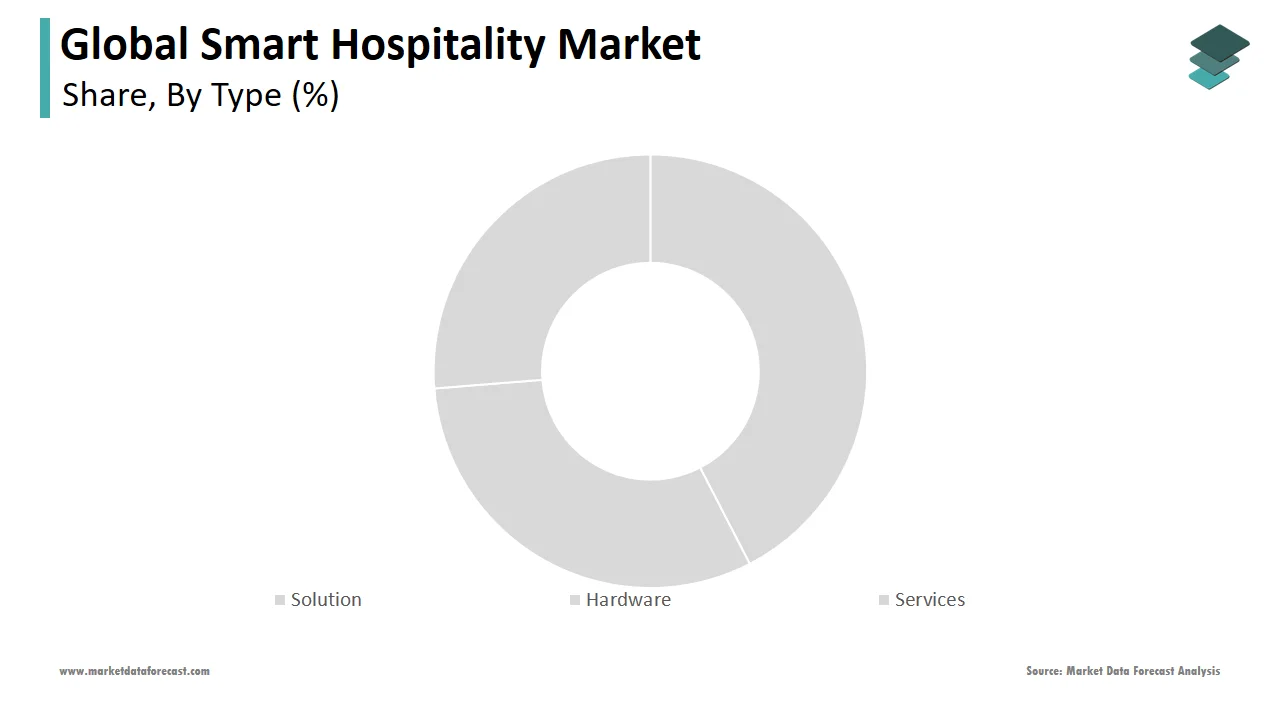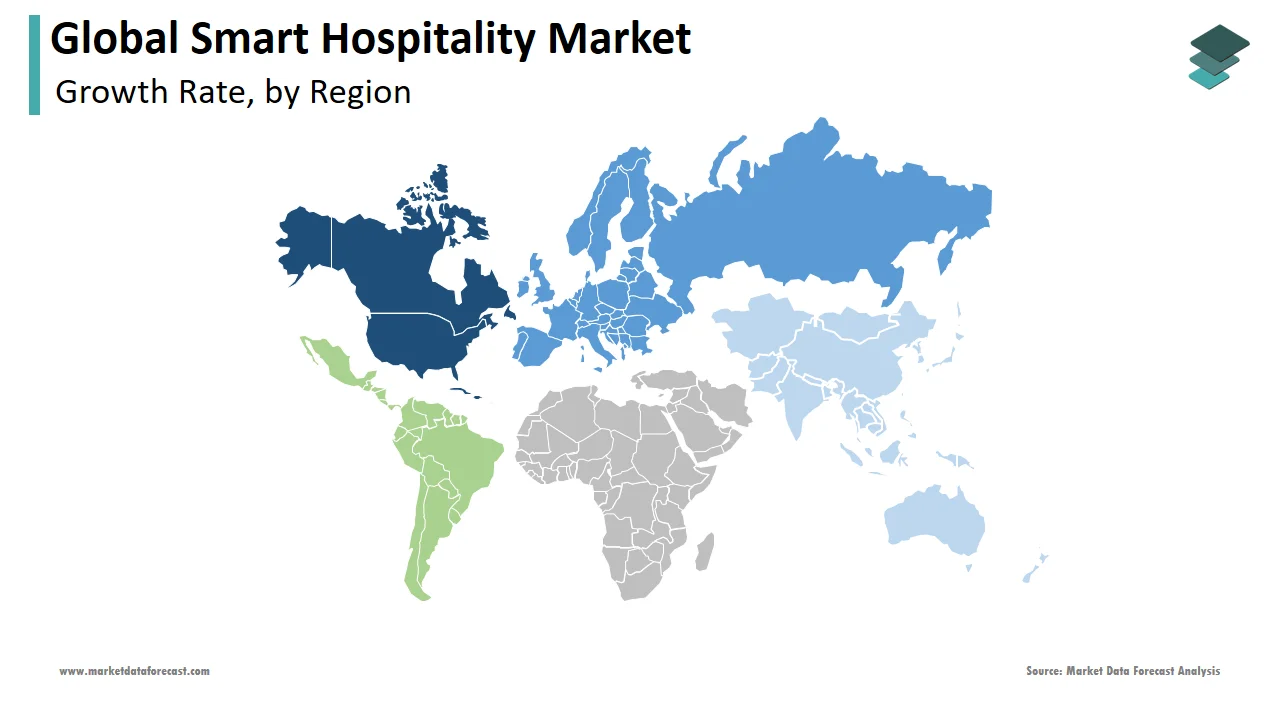Global Smart Hospitality Market Size, Share, Trends & Growth Forecast Report By Software (Hotel Building Automation System and Hotel Operation Management System), By Hotel Type (Resort & Spas, Boutique, Heritage, and Business), By Deployment Model (Off-Cloud Deployment and On-Cloud), and Region (North America, Europe, Asia-Pacific, Latin America, Middle East and Africa), Industry Analysis From 2025 To 2033.
Global Smart Hospitality Market Size
The size of the global smart hospitality market was worth USD 15.8 billion in 2024. The global market is anticipated to grow at a CAGR of 26.18% from 2025 to 2033 and be worth USD 128.11 billion by 2033 from USD 19.94 billion in 2025.
Smart hospitality refers to the use of technology in the hospitality industry, such as automated software and smart solutions. It's popular in hotels and cruise ships. It aids in cost reduction, increases staff efficiency, and provides guests with a one-of-a-kind experience that encourages them to return. It assists guests with room selection, the kind and number of rooms, room entertainment systems, and internet services. It is being widely adopted on a global scale. It contributes to a better guest experience, which increases the company's revenue.
MARKET DRIVERS
The market is expanding because of the rising demand for real-time optimized guest experience management.
The market is growing due to attractive revenue growth and low operating expenses. The market is expanding due to an increase in the deployment of IoT and energy management systems. The business is growing thanks to advanced technological breakthroughs in smart hospitality.
MARKET RESTRAINTS
The market's growth is being stifled by the high initial implementation costs. The market's growth is being hampered by the complexity of integration across legacy systems and networks. The market's expansion is being hampered by a scarcity of technically trained individuals.
REPORT COVERAGE
|
REPORT METRIC |
DETAILS |
|
Market Size Available |
2024 to 2033 |
|
Base Year |
2024 |
|
Forecast Period |
2025 to 2033 |
|
CAGR |
26.18% |
|
Segments Covered |
By Type, Deployment, Hotel, and Region. |
|
Various Analyses Covered |
Global, Regional & Country Level Analysis, Segment-Level Analysis, DROC, PESTLE Analysis, Porter’s Five Forces Analysis, Competitive Landscape, Analyst Overview of Investment Opportunities |
|
Regions Covered |
North America, Europe, APAC, Latin America, Middle East & Africa |
|
Market Leaders Profiled |
Schneider Electric (France), Siemens (Germany), IBM (US), BuildingIQ (US), Honeywell International (US), Oracle (US), Johnson Controls (US), Infor Inc (US), Winhotel Solutions (Spain), Huawei (China), NEC Corp (Japan), and Others. |
SEGMENT ANALYSIS
By Type Insights

Hotel management software (HMS) remains crucial for hoteliers wishing to improve the operation of their business as technology advances at a rapid rate in the hospitality industry. Hoteliers can use software to improve their overall hotel management system by streamlining administrative tasks.
Managers may generate reports in seconds using the automated system, which is accessible from anywhere in the world. Because it is an online system, the hotel management software allows managers quick and easy access to the business's activities, helping them to better plan the operation.
Hoteliers can gain real-time access to all of the hotel's data with hotel management software. It only takes a single button press to see which rooms are available, how many can be assigned for check-in, a guest's complete payment cycle, and so on.
By Deployment Insights
Platform-as-a-Service (PaaS) and Software-as-a-Service (SaaS) are two types of cloud deployment in the hospitality industry. This solution allows hotels to deploy software and services in a virtual ecosystem, lowering infrastructure costs. The cost of procuring, repairing, and powering server-class equipment is reduced when smart hospitality software is deployed in the cloud. This subscription model provides hoteliers with greater scalability at a lower cost of ownership. It also ensures data backup reliability while lowering the danger of security breaches. The cloud solution provider is in charge of the backend operations of cloud-deployed solutions. With all of the benefits that the cloud deployment model provides, demand for such solutions is expected to rise over the anticipated period as smart hospitality solutions increasingly incorporate sensors and other devices that necessitate the usage of cloud solutions.
By Hotel Insights
Smart occupancy sensors will allow business hotels to send menu notifications to guests' cell phones at the most convenient times, such as when they are in their rooms. These alerts may even include personalized recommendations based on previous orders. Many home food-delivery apps already provide a similar service, giving frequent users push notifications at their chosen ordering times on their favorite days. Such amenities are common in business hotels, as clients at these establishments want convenience. The demand for smart hospitality in business hotels is expected to expand through 2027, thanks to a surge in guest demand for convenience features. One barrier limiting the growth of the Historic hotel market is that implementing smart solutions in heritage hotels can be difficult due to the antiquity of their architecture.
REGIONAL ANALYSIS

The hospitality industry in North America is enormous and well-developed. The United States and Canada are global economic powerhouses, and a huge number of tourists and business travelers visiting these nations has proven to be a key driver for the smart hospitality sector in the region. This trend is projected to accelerate in the coming years as more digital advancements are implemented in the industry.
Europe dominates the worldwide sector due to technological improvements, strong internet infrastructure, and a predisposition toward IoT. The smart hospitality market is expected to grow as demand for enhanced operational efficiency at a fair cost grows. The APAC regions are predicted to grow at a higher rate due to their ability to manage outsourced solutions and a large number of contact centers.
KEY MARKET PLAYERS
Companies playing a prominent role in the global smart hospitality market include Schneider Electric (France), Siemens (Germany), IBM (US), BuildingIQ (US), Honeywell International (US), Oracle (US), Johnson Controls (US), Infor Inc (US), Winhotel Solutions (Spain), Huawei (China), NEC Corp (Japan), and Others.
RECENT MARKET HAPPENINGS
- In India, Schneider Electric has started its Green Yodha sustainable engagement campaign to urge enterprises, organizations, and individuals to take tangible climate action. The call aims to support India's greater commitment to COP26.
- Oracle Corporation and Cerner Corporation announced that Oracle will acquire Cerner for $95.00 per share, or $28.3 billion in equity value, in an all-cash tender offer. Cerner is a leading provider of digital information solutions that allow medical professionals in hospitals and health systems to provide better care to individual patients and communities.
- BostonGene Corporation and NEC Corporation have announced a strategic worldwide collaboration agreement that will allow the companies to offer BostonGene Tumor PortraitTM Tests in major international markets, with Japan serving as the first market outside of the United States.
MARKET SEGMENTATION
This global smart hospitality market research report has been segmented and sub-segmented based on type, deployment, hotel and region.
By Type
- Solution
- Hardware
- Services
By Deployment
- Cloud
- On-Premise
By Hotel
- Business Hotels
- Heritage & Boutique Hotels
- Resorts & Spas
By Region
- North America
- Europe
- Asia Pacific
- Latin America
- Middle East & Africa
Frequently Asked Questions
1. What is the Smart Hospitality Market growth rate during the projection period?
The Global Smart Hospitality Market is expected to grow with a CAGR of 26.18% between 2025 and 2033.
2. What can be the total Smart Hospitality Market value?
The Global Smart Hospitality Market is expected to reach a revised size of US$ 128.11 billion by 2033.
3. Name any three Smart Hospitality Market key players?
IBM (US), BuildingIQ (US), and Honeywell International (US) are the three Smart Hospitality Market key players.
Related Reports
Access the study in MULTIPLE FORMATS
Purchase options starting from $ 2500
Didn’t find what you’re looking for?
TALK TO OUR ANALYST TEAM
Need something within your budget?
NO WORRIES! WE GOT YOU COVERED!
Call us on: +1 888 702 9696 (U.S Toll Free)
Write to us: [email protected]
